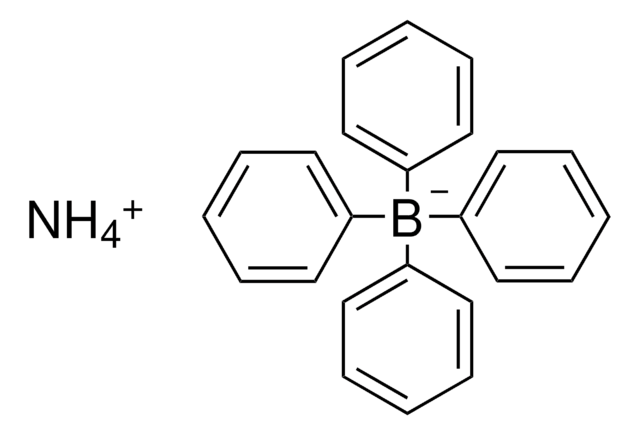All Photos(4)
About This Item
Linear Formula:
(C2H5)4BNa
CAS Number:
Molecular Weight:
150.05
MDL number:
UNSPSC Code:
12161600
PubChem Substance ID:
NACRES:
NA.22
Recommended Products
Quality Level
Assay
97%
reaction suitability
core: boron
reagent type: catalyst
mp
140-142 °C (lit.)
SMILES string
[Na+].CC[B-](CC)(CC)CC
InChI
1S/C8H20B.Na/c1-5-9(6-2,7-3)8-4;/h5-8H2,1-4H3;/q-1;+1
InChI key
SZSBMTRYJRHYNI-UHFFFAOYSA-N
Looking for similar products? Visit Product Comparison Guide
General description
Sodium tetraethylborate (NaBEt4) is an air and moisture-sensitive pyrophoric organoboron compound. It is very reactive in the presence of certain organometallic species and is used as an ethyl transfer reagent.
Application
Sodium tetraethylborate can be used as a derivatizing agent in the GC-MS analyses of fenbutatin oxide and alkyl tin compounds.
related product
Product No.
Description
Pricing
Signal Word
Danger
Hazard Statements
Precautionary Statements
Hazard Classifications
Pyr. Sol. 1 - Water-react 2
Storage Class Code
4.2 - Pyrophoric and self-heating hazardous materials
WGK
WGK 3
Flash Point(F)
Not applicable
Flash Point(C)
Not applicable
Personal Protective Equipment
dust mask type N95 (US), Eyeshields, Gloves
Choose from one of the most recent versions:
Already Own This Product?
Find documentation for the products that you have recently purchased in the Document Library.
Customers Also Viewed
Stig Valdersnes et al.
Journal of AOAC International, 102(1), 278-285 (2018-12-31)
Organotin compounds are anthropogenic metal species with multiple uses as pesticides, preservatives, antifouling agents, biocides, and catalysts. Butyltins are the main organotin compounds found in biota, and the highest levels are found in marine foodstuffs. In this paper, we present
M Leermakers et al.
Analytical and bioanalytical chemistry, 381(6), 1272-1280 (2005-02-16)
Monobutyltin (MBuT), dibutyltin (DBuT), and tributyltin (TBuT) mixtures have been separated and quantified by gas chromatography with pulsed flame-photometric detection (GC-PFPD). The compounds were first derivatized with NaBEt4, then extracted with hexane and injected into the GC in splitless mode.
Andrés Rodríguez-Cea et al.
Environmental science and pollution research international, 23(5), 4876-4885 (2015-11-08)
The degradation of butyltin compounds in surface water samples under different storage conditions has been studied. A triple spike solution, containing monobutyltin (MBT), dibutyltin (DBT) and tributyltin (TBT) labelled with a different tin isotope, was added to the sample to
Xiaonan Ji et al.
Environmental science and pollution research international, 26(17), 17707-17718 (2019-04-28)
Methylmercury (MeHg) in sediment is difficult to be determined due to its low concentration and binding compounds like sulfide and organic matter. Moreover, wet sediment samples have been suggested to behave differently from certified reference materials in MeHg analysis. Optimal
Jacqueline R Gerson et al.
Science advances, 6(48) (2020-11-29)
Artisanal and small-scale gold mining (ASGM) is the largest global source of anthropogenic mercury emissions. However, little is known about how effectively mercury released from ASGM is converted into the bioavailable form of methylmercury in ASGM-altered landscapes. Through examination of
Our team of scientists has experience in all areas of research including Life Science, Material Science, Chemical Synthesis, Chromatography, Analytical and many others.
Contact Technical Service










